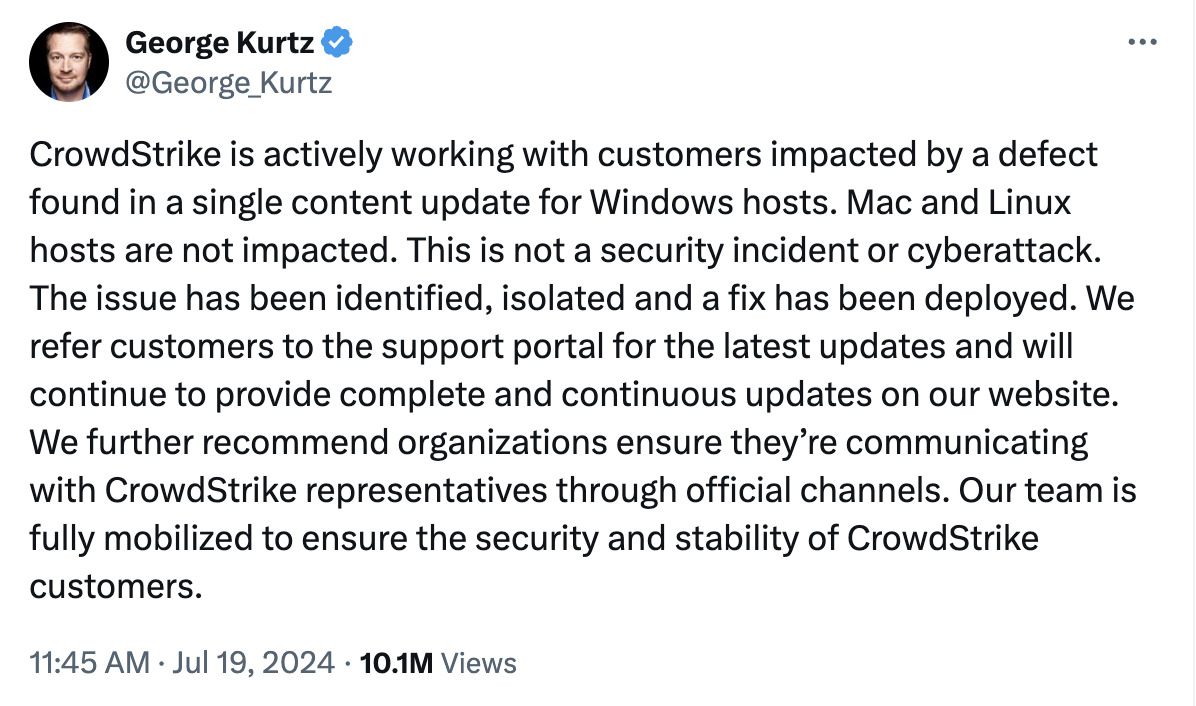
The Bouquet Residence
Keeping up appearances in tech

The word "rant" is used far too often, and in various ways.
It's meant to imply aimless, angry venting.
But often it means:
Naming problems without proposing solutions,
this makes me feel confused.
Naming problems and assigning blame,
this makes me feel bad.
I saw a remarkable pair of tweets the other day.
In the wake of the outage, the CEO of CrowdStrike sent out a public announcement. It's purely factual. The scope of the problem is identified, the known facts are stated, and the logistics of disaster relief are set in motion.

Millions of computers were affected. This is the equivalent of a frazzled official giving a brief statement in the aftermath of an earthquake, directing people to the Red Cross.
Everything is basically on fire for everyone involved. Systems are failing everywhere, some critical, and quite likely people are panicking. The important thing is to give the technicians the information and tools to fix it, and for everyone else to do what they can, and stay out of the way.
In response, a communication professional posted an 'improved' version:
![I’m the CEO of CrowdStrike. I’m devastated to see the scale of today’s outage and will be personally working on it together with our team until it’s fully fixed for every single user.
But I wanted to take a moment to come here and tell you that I am sorry. People around the world rely on us, and incidents like this can’t happen. This came from an error that ultimately is my responsibility.
Here’s what we know: [brief synopsis of what went wrong and how it wasn’t a cyberattack etc.]
Our entire team will be working all day, all night, all weekend, and however long it takes to resolve this and make sure it doesn’t happen again.
We’ll be sharing updates as often as possible, which you can find here [link]. If you need to contact us, the quickest way is to go here [link].
We’re responding as quickly as possible. Thank you to everyone who has alerted us to the outage, and again, please accept my deepest apologies. More to come soon.](https://acko.net/files/bouquet/statement2.png)
Credit where credit is due, she nailed the style. 10/10. It seems unobjectionable, at first. Let's go through, shall we?

Opposite Day
First is that the CEO is "devastated." A feeling. And they are personally going to ensure it's fixed for every single user.
This focuses on the individual who is inconvenienced. Not the disaster. They take a moment out of their time to say they are so, so sorry a mistake was made. They have let you and everyone else down, and that shouldn't happen. That's their responsibility.
By this point, the original statement had already told everyone the relevant facts. Here the technical details are left to the imagination. The writer's self-assigned job is to wrap the message in a more palatable envelope.
Everyone will be working "all day, all night, all weekends," indeed, "however long it takes," to avoid it happening again.
I imagine this is meant to be inspiring and reassuring. But if I was a CrowdStrike technician or engineer, I would find it demoralizing: the boss, who will actually be personally fixing diddly-squat, is saying that the long hours of others are a sacrifice they're willing to make.
Plus, CrowdStrike's customers are in the same boat: their technicians get volunteered too. They can't magically unbrick PCs from a distance, so "until it's fully fixed for every single user" would be a promise outsiders will have to keep. Lovely.
There's even a punch line: an invitation to go contact them, the quickest way linked directly. It thanks people for reaching out.
If everything is on fire, that includes the phone lines, the inboxes, and so on. The most stupid thing you could do in such a situation is to tell more people to contact you, right away. Don't encourage it! That's why the original statement refers to pre-existing lines of communication, internal representatives, and so on. The Support department would hate the CEO too.

Root Cause
If you're wondering about the pictures, it's Hyacinth Bucket, from 90s UK sitcom Keeping Up Appearances, who would always insist "it's pronounced Bouquet."
Hyacinth's ambitions always landed her out of her depth, surrounded by upper-class people she's trying to impress, in the midst of an embarrassing disaster. Her increasingly desperate attempts to save face, which invariably made things worse, are the main source of comedy.
Try reading that second statement in her voice.
I’m devastated to see the scale of today’s outage and will be personally working on it together with our team until it’s fully fixed for every single user.
But I wanted to take a moment to come here and tell you that I am sorry. People around the world rely on us, and incidents like this can’t happen. This came from an error that ultimately is my responsibility.
I can hear it perfectly, telegraphing Britishness to restore dignity for all. If she were in tech she would give that statement.
It's about reputation management first, projecting the image of competence and accountability. But she's giving the speech in front of a burning building, not realizing the entire exercise is futile. Worse, she thinks she's nailing it.
If CrowdStrike had sent this out, some would've applauded and called it an admirable example of wise and empathetic communication. Real leadership qualities.
But it's the exact opposite. It focuses on the wrong things, it alienates the staff, and it definitely amplifies the chaos. It's Monty Python-esque.
Apologizing is pointless here, the damage is already done. What matters is how severe it is and whether it could've been avoided. This requires a detailed root-cause analysis and remedy. Otherwise you only have their word. Why would that re-assure you?
The original restated the company's mission: security and stability. Those are the stakes to regain a modicum of confidence.
You may think that I'm reading too much into this. But I know the exact vibe on an engineering floor when the shit hits the fan. I also know how executives and staff without that experience end up missing the point entirely. I once worked for a Hyacinth Bucket. It's not an anecdote, it's allegory.
They simply don't get the engineering mindset, and confuse authority with ownership. They step on everyone's toes without realizing, because they're constantly wearing clown shoes. Nobody tells them.

Softness as a Service
The change in style between #1 and #2 is really a microcosm of the conflict that has been broiling in tech for ~15 years now. I don't mean the politics, but the shifting of norms, of language and behavior.
It's framed as a matter of interpersonal style, which needs to be welcoming and inclusive. In practice this means they assert or demand that style #2 be the norm, even when #1 is advisable or required.
Factuality is seen as deficient, improper and primitive. It's a form of doublethink: everyone's preference is equally valid, except yours, specifically.
But the difference is not a preference. It's about what actually works and what doesn't. Style #1 is aimed at the people who have to fix it. Style #2 is aimed at the people who can't do anything until it's fixed. Who should they be reaching out to?
In #2, communication becomes an end in itself, not a means of conveying information. It's about being seen saying the words, not living them. Poking at the statement makes it fall apart.
When this becomes the norm in a technical field, it has deep consequences:
- Critique must be gift-wrapped in flattery, and is not allowed to actually land.
- Mistakes are not corrected, and sentiment takes precedence over effectiveness.
- Leaders speak lofty words far from the trenches to save face.
- The people they thank the loudest are the ones they pay the least.
Inevitably, quiet competence is replaced with gaudy chaos. Everyone says they're sorry and responsible, but nobody actually is. Nobody wants to resign either. Sound familiar?

Cope and Soothe
The elephant in the room is that #1 is very masculine, while #2 is more feminine. When you hear "women are more empathetic communicators", this is what it means. They tend to focus on the individual and their relation to them, not the team as a whole and its mission.
Complaints that tech is too "male dominated" and "notoriously hostile to women" are often just this. Tech was always full of types who won't preface their proposals and criticisms with fluff, and instead lean into autism. When you're used to being pandered to, neutrality feels like vulgarity.
The notable exceptions are rare and usually have an exasperating lead up. Tech is actually one of the most accepting and egalitarian fields around. The maintainers do a mostly thankless job.
"Oh so you're saying there's no misogyny in tech?" No I'm just saying misogyny doesn't mean "something 1 woman hates".
The tone is really a distraction. If someone drops an analysis, saying shit or get off the pot, even very kindly and patiently, some will still run away screaming. Like an octopus spraying ink, they'll deploy a nasty form of #2 as a distraction. That's the real issue.
Many techies, in their naiveté, believed the cultural reformers when they showed up to gentrify them. They obediently branded heretics like James Damore, and burned witches like Richard Stallman. Thanks to racism, words like 'master' and 'slave' are now off-limits as technical terms. Ironic, because millions of computers just crashed because they worked exactly like that.


The cope is to pretend that nothing has truly changed yet, and more reform is needed. In fact, everything has already changed. Tech forums used to be crucibles for distilling insight, but now they are guarded jealously by people more likely to flag and ban than strongly disagree.
I once got flagged on HN because I pointed out Twitter's mass lay-offs were a response to overhiring, and that people were rooting for the site to fail after Musk bought it. It suggested what we all know now: that the company would not implode after trimming the dead weight, and that they'd never forgive him for it.
Diversity is now associated with incompetence, because incompetent people have spent over a decade reaching for it as an excuse. In their attempts to fight stereotypes, they ensured the stereotypes came true.

Bait and Snitch
The outcry tends to be: "We do all the same things you do, but still we get treated differently!" But they start from the conclusion and work their way backwards. This is what the rewritten statement does: it tries to fix the relationship before fixing the problem.
The average woman and man actually do things very differently in the first place. Individual men and women choose. And others respond accordingly. The people who build and maintain the world's infrastructure prefer the masculine style for a reason: it keeps civilization running, and helps restore it when it breaks. A disaster announcement does not need to be relatable, it needs to be effective.
Furthermore, if the job of shoveling shit falls on you, no amount of flattery or oversight will make that more pleasant. It really won't. Such commentary is purely for the benefit of the ones watching and trying to look busy. It makes it worse, stop pretending otherwise.
There's little loyalty in tech companies nowadays, and it's no surprise. Project and product managers are acting more like demanding clients to their own team, than leaders. "As a user, I want..." Yes, but what are you going to do about it? Do you even know where to start?
What's perceived as a lack of sensitivity is actually the presence of sensibility. It's what connects the words to the reality on the ground. It does not need to be improved or corrected, it just needs to be respected. And yes it's a matter of gender, because bashing men and masculine norms has become a jolly recreational sport in the overculture. Mature women know it.
It seems impossible to admit. The entire edifice of gender equality depends on there not being a single thing men are actually better at, even just on average. Where men and women's instincts differ, women must be right.
It's childish, and not harmless either. It dares you to call it out, so they can then play the wounded victim, and paint you as the unreasonable asshole who is mean. This is supposed to invalidate the argument.
* * *
This post is of course a giant cannon pointing in the opposite direction, sitting on top of a wall. Its message will likely fly over the reformers' heads.
If they read it at all, they'll selectively quote or paraphrase, call me a tech-bro, and spool off some sentences they overheard, like an LLM. It's why they adore AI, and want it to be exactly as sycophantic as them. They don't care that it makes stuff up wholesale, because it makes them look and feel competent. It will never tell them to just fuck off already.
Think less about what is said, more about what is being done. Otherwise the next CrowdStrike will probably be worse.